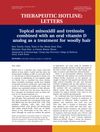Tretinoin
aka - Retin-A
🛒 Where to find Tretinoin
Tracking 11 topical products and 1 oral product by companies like AllDayChemist, Amazon, Inhouse Pharmacy, Jack Health and Roman. View all 12 products »Tretinoin, a derivative of vitamin A, has been extensively studied and utilized in dermatology for its potent effects on skin renewal and repair. Known scientifically as all-trans-retinoic acid, tretinoin is part of the retinoid family, which affects cell growth and differentiation. Its journey began in the 1960s when it was first used to treat acne. However, researchers soon discovered its broader dermatological benefits, including its ability to reduce fine wrinkles, skin roughness, and improve skin color and texture. These properties are attributed to tretinoin's ability to modulate gene expression and cellular differentiation, as well as its potent antioxidant effects that counteract skin damage.
In the realm of alopecia and hair growth, tretinoin's role has been intriguing. Its primary use has been as an adjunct to other treatments, notably minoxidil, for androgenetic alopecia. Tretinoin is believed to enhance the percutaneous absorption of minoxidil, increasing its efficacy. This synergy is likely due to tretinoin’s effect on the stratum corneum, enhancing skin permeability and possibly affecting follicular sulfotransferase enzymes, which are crucial for the conversion of minoxidil into its active form.
Research into tretinoin's direct and adjunctive roles in treating hair loss has provided encouraging results. Studies have demonstrated that tretinoin, both alone and in combination with minoxidil, can significantly improve hair growth outcomes in conditions like androgenetic alopecia and alopecia areata. One study highlighted tretinoin's ability to boost minoxidil absorption by nearly three times without adverse effects, while another showed its potential in upregulating crucial enzymes for minoxidil's action. Additionally, a novel minoxidil and tretinoin liposomal hydrogel has shown promise in delivering both drugs effectively, suggesting an innovative approach to hair loss treatment.
The community's sentiment towards tretinoin is mixed but generally positive, with a focus on its combination with minoxidil. Some users report significant improvements when adding tretinoin to their regimen, particularly for those not responding to minoxidil alone. However, there are cautionary tales of potential adverse effects, including increased skin sensitivity and irritation. Community discussions emphasize the importance of careful application, including starting with low concentrations and integrating moisturizing and sun protection strategies to mitigate side effects.
In summary, tretinoin is a potent dermatological agent with a unique role in enhancing hair loss treatments, especially in combination with minoxidil. Its ability to improve drug absorption and possibly act directly on hair follicle dynamics makes it a valuable tool in the treatment of various forms of alopecia.
Research
20 / 1000+ resultsresearch Topical Tretinoin for Hair Growth Promotion

research Efficacy of 5% Minoxidil Versus Combined 5% Minoxidil and 0.01% Tretinoin for Male Pattern Hair Loss

research Promotive Effect of Minoxidil Combined with All-Trans Retinoic Acid (Tretinoin) on Human Hair Growth In Vitro
research Allergic and Irritant Contact Dermatitis Compared in the Treatment of Alopecia Totalis and Universalis: A Comparison of the Value of Topical Diphencyprone and Tretinoin Gel

research Influence of Tretinoin on the Percutaneous Absorption of Minoxidil from an Aqueous Topical Solution
research Topically Applied Tretinoin in the Treatment of Trichostasis Spinulosa

research Platelet-Rich Plasma Versus Tretinoin in Treatment of Striae Distensae: A Comparative Study

research Alopecia in Congenital Hidrotic Ectodermal Dysplasia Responding to Treatment with a Combination of Topical Minoxidil and Tretinoin

research Simultaneous Spectrophotometric Determination of Minoxidil and Tretinoin by the H-Point Standard Addition Method and Partial Least Squares
research Tretinoin Treatment of Fox-Fordyce Disease

research Optimization, Characterization, and Follicular Targeting Assessment of Tretinoin and Bicalutamide Loaded Niosomes

research Exploring the Potential of Minoxidil Tretinoin Liposomal-Based Hydrogel for Topical Delivery in the Treatment of Androgenic Alopecia

research Promotive Effect of Topical Ketoconazole, Minoxidil, and Minoxidil with Tretinoin on Hair Growth in Male Mice

research Tretinoin Enhances Minoxidil Response in Androgenetic Alopecia Patients by Upregulating Follicular Sulfotransferase Enzymes
research Fox-Fordyce Disease: Control with Tretinoin Cream

research Beard Hair Density Increase: A Possible Role of Topical Tretinoin Application?
research Comparative Study of Efficacy of Topical Minoxidil 5% and Combination of Topical Minoxidil 5%, Topical Azelaic Acid 1.5% and Topical Tretinoin 0.01% Based on Dermoscopic Analysis in Androgenetic Alopecia
